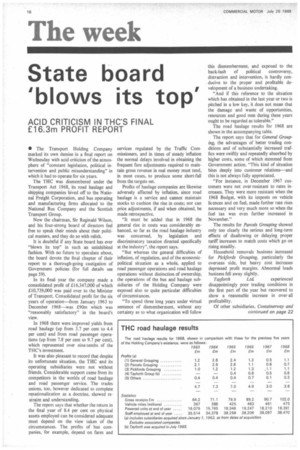The week
Page 18

If you've noticed an error in this article please click here to report it so we can fix it.
State board 'blows its top'
ACID CRITICISM IN THC'S FINAL £16.3m PROFIT REPORT
• The Transport Holding Company marked its own demise in a final report on Wednesday with acid criticism of the atmosphere of "constant legislation, political intervention and public misunderstanding" in which it had to operate for six years.
The THC was dismembered under the Transport Act 1968, its road haulage and shipping companies hived off to the National Freight Corporation, and bus operating and manufacturing firms allocated to the National Bus Company and the Scottish Transport Group.
Now the chairman, Sir Reginald Wilson, and his four-strong board of directors feel free to speak their minds about their political masters, and they do so with relish.
It is doubtful if any State board has ever "blown its top" in such an uninhibited fashion. With no future to speculate about, the board devote the final chapter of their report to a thorough-going castigation of Government policies (for full details see page 59).
In its final, year the company made a consolidated profit of £16,347,000 of which £10,739,000 was paid over to the Minister of Transport. Consolidated profit for the six years of operation-from January 1963 to December 1968-was £90m which was "reasonably satisfactory" in the board's view.
In 1968 there were improved yields from road haulage (up from 3,7 per cent to 4.4 per cent) and from road passenger operations (up from 7.8 per cent to 9.7 per cent), which represented over nine-tenths of the THC's investment.
It was also pleasant to record that despite its unfortunate situation, the THC and its operating subsidiaries were not without friends. Considerable support came from its competitors in the worlds of road haulage and road passenger service. The trades unions, too, however dedicated to complete renationalization as a doctrine, showed restraint and understanding.
The report says that whether the return in the final year of 8.4 per cent on physical assets employed can be considered adequate must depend on the view taken of the circumstances. The profits of bus companies, for example, depend on fares and services regulated by the Traffic Commissioners, and in times of steady inflation the normal delays involved in obtaining the frequent fare adjustments required to maintain gross revenue in real money must tend, in most cases, to produce some short-fall from the targets set.
Profits of haulage companies are likewise adversely affected by inflation, since road haulage is a service and cannot maintain stocks to cushion the rise in costs; nor can price adjustments, if and when obtained, be made retrospective.
"It must be added that in 1968 the general rise in costs was considerably enhanced, so far as the road haulage industry was concerned, by legislation and discriminatory taxation directed specifically at the industry", the report says.
"But whereas the general difficulties of inflation, of regulation, and of the economicpolitical situation as a whole, applied to road passenger operations and road haulage operations without distinction, of ownership, the operations of the bus and haulage subsidiaries of the Holding Company were exposed also to quite particular difficulties of circumstances.
"To spend three long years under virtual sentence of dismemberment, without any certainty as to what organization will follow this dismemberment, and exposed to the back-lash of political controversy, distraction and intervention, is hardly conducive to the proper and profitable development of a business undertaking.
"And if this reference to the situation which has obtained in the last year or two is pitched in a low key, it does not mean that the damage and waste of opportunities, resources and good men during these years ought to be regarded as tolerable."
The road haulage results for 1968 are shown in the accompanying table.
The report says that for General Grouping, the advantages of better trading conditions and of substantially increased traffics were swiftly and repeatedly absorbed by higher costs, some of which stemmed from Government action. "This kind of situation bites deeply into customer relations-and this is not always fully appreciated.
"For instance, in December 1967 customers were not over-resistant to rates increases. They were more resistant when the 1968 Budget, with its imposts on vehicle licences and on fuel, made further rate rises necessary and very much more so when the fuel tax was even further increased in November."
The results for Parcels Grouping showed only too clearly the serious and long-term effects of disallowing or delaying proper tariff increases to match costs which go on rising steadily.
Household removals business increased for Pickfords Grouping, particularly the overseas side, but heavy cost increases depressed profit margins_ Abnormal loads business fell away slightly.
Tayforth Ltd experienced disappointingly poor trading conditions in the first part of the year but recovered to show a reasonable increase in over-all profitability.
Of other subsidiaries, Containerway and continued on page 22
















































































































